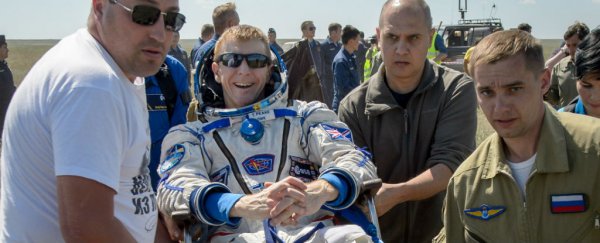British astronaut Tim Peake says he's experiencing the "world's worst hangover" after spending just six months in space.
Having returned to Earth last week after a relatively brief stint on the International Space Station, Peake will now undergo three weeks of intense rehabilitation to get him acclimatised to normal life again.
"You're excited to be back, but you can't fully enjoy the experience because, to be quite frank, you feel pretty terrible," Peake told ITV News. "It can only be described as something akin to the world's worst hangover in terms of the everything that is going on in your head."
In the coming weeks, Peake will maintain a strict exercise regime, while undergoing an array of medical checks, including blood tests, MRI scans, and psychological evaluations, and will have his heart and blood circulation monitored on what's known as a tilt table - something that can measure the body's response to gravity.
Researchers will also try to determine the underlying causes of the dizziness, nausea, and faintness he's reportedly been feeling since he got home, and the sense of vertigo every time he moves his head.
"His work will be far from finished," the European Space Agency (ESA) told the press. "Many scientists will be eager to get more data on how his body and mind have reacted to his time in space. But first, Tim must adapt to living on Earth again."
As recently grounded astronaut Scott Kelly is currently experiencing for himself, the transition from Earth to space is a whole lot easier than going from space to Earth.
Not only did Kelly return to Earth in March riddled with muscle pains and fatigue, he told the crowd at a NASA event earlier this month that his skin felt like it was burning every time he sits or walks:
"After I got back, I've talked about just being really sore and stiff. My skin had not touched anything in 340 days except just your clothing. Anything it touched, it felt like it was on fire. I actually had some rashes and kind of discolouration anywhere I had contact. And then I kind of had flu-like symptoms for a few days.
Had I not been in space for a year and I knew what this was, I would have gone to the emergency room and said, 'Hey, I don't know what's wrong with me, but I'm not feeling that great.'"
Perhaps even stranger, Kelly gained 5 cm (2 inches) during his record year in space - about a 3 percent growth - which he proceeded to lose again once he returned to Earth.
Like Kelly, Peake's muscles and bones will have been significantly weakened in the microgravity environment of space, and the size of his heart will have physically decreased - a side effect of space that's fortunately only temporarily.
"Astronauts lose up to 1.5 percent of their bone mass for each month spent in space," the Associated Press reports. "The loss is greatest in the upper thighs and pelvis, and can increase the risk of injuries such as hip fractures."
And then there's all that dangerous cosmic radiation to think about.
Of course, the elephant in the room in all of this is we're talking about what happens after a relatively short amount of time in space.
In October 2015, Kelly set the record for the total accumulated number of days spent in space by an American astronaut, and in March, he returned from spending 340 consecutive days on the International Space Station. So if anyone can give you a good indication of what it's like out there, it's him.
But if we're serious about our dreams of journeying elsewhere in the Solar System, we're going to have to figure out what happens after a year, or two, or 10.
A study back in May found that spacefaring mice had signs of liver damage after just 13.5 days aboard the space shuttle Atlantis, the researchers describing their symptoms as being similar to the hallmarks of non-alcoholic fatty liver disease (NAFLD), and early indicators of fibrosis.
"It generally takes a long time, months to years, to induce fibrosis in mice, even when eating an unhealthy diet," said one of the team, anaesthesiologist and physicist Karen Jonscher from the University of Colorado. "If a mouse is showing nascent signs of fibrosis without a change in diet after 13.5 days, what is happening to the humans?"
Jonscher and her team are hoping to put more mice in space for a longer period of time, but when it comes to health studies, nothing is as accurate as the real thing.
With Mars One recruitment well and truly underway to select volunteers for a one-way trip to the Red Planet, these aspiring space tourists might just end up being guinea pigs in more ways than one (if they ever even make it off the ground).
